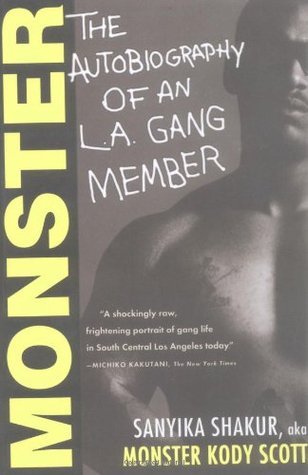So apparently Sanyika Shakur actually has a Wikipedia page, something I did not know prior to reading this book. (He was also friends with Tupac!) I found this book totally randomly in a Little Free Library and thought it would make a great addition to the list of books by Black authors that I am reading for Black History Month, as I know very little about Black Nationalism or L.A. gang violence, and before Shakur converted to Islam and Black Nationalism and started trying to devote his time to turn people away from gangs, he was a pretty major player in his local syndicate.
MONSTER, which was his nickname he got for beating up a guy, is Shakur's story of how he got into the gang, how he eventually got caught, what prison was like, and what he did after. It's an interesting memoir and I can appreciate his motives for writing it and coming clean about his past, even if a lot of what happened in it disturbed me. I also think that he brings up a pretty important issue, which is similarly touched upon in Patricia Williams's memoir RABBIT, which is that infrastructural racism contributes to crime because it makes it possible for Black people and people of color in low-income areas to make money and make community networks, which they might not otherwise have the privilege of getting. This does not make gang violence or, in the case of RABBIT, drug-dealing, morally ethical, but it does make it understandable-- at least from a logic perspective. If the doors to legitimate ways of making money and earning a living are closed to you and your family, why wouldn't you turn to other channels instead?
My favorite parts of the book were his interactions with his mom and girlfriend(s), and what his upbringing was like, and his interactions with his family. I also really liked the descriptions of 1980s L.A. and how well he knew his neighborhood. There was a description of him and his mom in an Asian-owned grocery store and another of one of his associates and a boombox that just felt very 1980s. His interest in Black Nationalism and his African cultural roots was also interesting and I wish there was more about that, and what he talked to the younger men in his community about after prison. Most of the memoir is a recount of his crimes, which started to feel repetitive and impersonal-- probably by necessity, but it could make the writing feel cold. Although I will admit that I smiled when he was reading The Godfather and using it for inspo on how he wanted to run his own gang. It was both disturbing and quirky, and felt like something a character in a movie might do. I don't know-- I thought it was funny. Honestly, for a subject I feel so uncomfortable with, he made it fairly easy to read. So take from that what you will. Honestly, if you're at all curious about L.A. history or what happens in a gang (hopefully for research purposes only), it's worth the read.
2 to 2.5 out of 5 stars

No comments:
Post a Comment
Note: Only a member of this blog may post a comment.